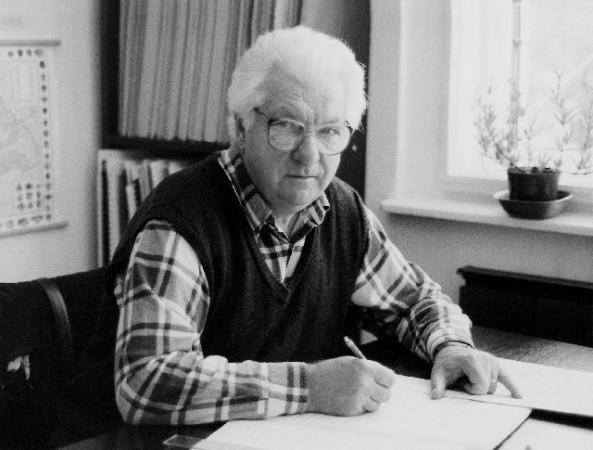
20 January 1935, Budapest
After initial studies in the provinces and a stint learning the trade of engine fitter, Sándor Balassa's first intensive musical education was at the Budapest Béla Bartók Specialist Music Secondary School, where he attended a preparatory course for future choir masters. After that he studied composition at the Music Academy as Endre Szervánszky's pupil, gaining his composer's diploma in 1965.
Even while still a student at the Music Academy, he was employed by Hungarian Radio, where he worked for roughly two decades as a music producer. His next workplace was the Music Academy, where between 1981 and 1995 he taught orchestration to students of composition at various stages of their studies.
Balassa's career as a composer began at the end of the sixties, with the highly successful premier in 1969 of his Requiem for Lajos Kassák (Rekviem Kassák Lajosért) (Translator's note: Kassák was a prominent modernist poet and artist, 1887-1967) From this time onwards almost every one of Balassa's compositions were in the forefront of contemporary Hungarian composing: his opera, The Man Outside (Az Ajtón Kívül, 1973-1977), based on Wolfgang Borchert's play, represented an outstanding success for the new Hungarian opera genre, demonstrating the composer's aptitude for shaping drama, as well as his stylistic and artistic maturity. This was followed by The third planet (A harmadik bolygó, 1987), a one-act opera, which both in content and in the artistic sphere manifested its author's social-moral commitment, his sense of responsibility for the natural-human survival of our world. Following his creation of a musical structure organised in oratorio tableau, Balassa's third opera, Karl and Anna (Karl és Anna – 1987-1992), again takes place in the dramatically tragic personal dimension where the paths of human lives and history cross. (Based on L. Frank's libretto.)
His compositions in the orchestral, chamber and vocal spheres show achievements of a similar magnitude: several of his works had an enthusiastic reception abroad; in fact, often his compositions came about in response to commissions. Thus, his work, Tabulae, composed for chamber ensemble and orchestra, was commissioned by ORF, the orchestra work, Chant for Glarius (Glariusi ének) by the Koussevitsky Foundation, the Calls and shouts (Hívások és kiáltások) by the Boston Symphony Orchestra, the Diary of a daydreamer (Egy álmodozó naplója) by the E. S. Coolidge Foundation, and the orchestral work, Three fantasies (Három fantasia), by the BBC Philharmonic Orchestra. More recently he received commissions from Hungarian ensembles as well, of which the commissions as the Pécs Symphonic Orchestra, whose in-house composer he is, are the most noteworthy. It is thanks to these that such works were composed by Balassa as Sons of the sum (A nap fiai), Four portraits (négy arckép), Plot 301 (301-es parcella) (Translator's note: where Imre Nagy was buried in an unmarked grave after his execution), Pécs concerto (Pécsi concerto), Valley of the Huns (Hunok völgye), and Hungarian coronation music (Magyar koronázási zene).
Towards the end of the 20th century, Balassa's composer's outlook and style underwent an important transformation. Breaking with the earlier use of free dodecaphonic structures, he became committed to a consequent diatonic style, whose main source he considers to be the Viennese classicist period of European music history and the Hungarian folk traditions. It is within the framework of this stylistic freedom in a new sense that he creates the musical characteristics of his new works. Simultaneously with his new outlook, the demand for a more direct connection manifests itself in his creations, approaching both the audience of his age and its performing arts. These endeavours were validated by the success of the Hungarian Opera House's 1995 premier of Karl and Anna, and of the performances of other of his more recent compositions.
The recognition of his work as a composer is shown by his many awards: the Erkel Prize (1972), the title, Meritorious Artist (1978), the Kossuth Prize (1983), the Béla Bartók-Ditta Pásztory Prize (1988 and 1998), and the title, Outstanding Artist (1989).
M.B.


